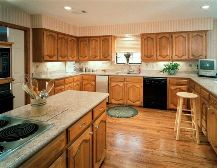
Alternative To Replacing Old Kitchen Cabinets
Kitchen cabinet refacing is an excellent alternative to replacing your
old cabinets, especially if they are still in good condition. If you know
the basics of kitchen cabinet refacing, you should have no difficulty
refacing the cabinets yourself. By doing the work yourself, you can save at
least one-third and possibly twice the cost of new cabinets. If you choose
not to do the work yourself, you might consider hiring the services of a
cabinetmaking company who has experience in refacing. They may be able to
add several new features and conveniences to your cabinets giving your
kitchen even more of a remodeled look.
You should first choose a door type and style. If you have traditional
face-frame cabinets, choose a door that will set into the frame but overlay
it by a half inch or between what is referred to as a 3/8 inch inset. Doors
for frameless cabinets can be with inset or overlay, though fully inset
doors require more skill to fit and require perfect square openings. When
choosing the door style, you need to determine the wood species, profile and
finish. For instance, the profile could be a raised or flat panel and the
finish could be painted, pre-finished natural or unfinished. If possible,
ordering the door pre-finished in a style you like can save time and usually
produce a better quality finish. However, a benefit to unfinished doors is
that you can match them to other cabinets or a particular style you already
have in your kitchen or home.
Next, choose the hinges and measure for the doors and drawers. Fully
concealed hinges with either overly or fully inset doors, which you should
keep in mind as you choose a door type and style. When choosing hinges, be
sure to consider your door's opening capacity, ranging from 100 to 180
degrees, as well as clearance for roll-out shelves, snap-closing compared to
free-swinging and adjustability. Be sure to measure the height and width of
all door and drawer openings to at least within 1/16 inch, including the
false door front opening beneath your sink. For single-door openings, you
need to add two times the amount of any overlay and, when two doors are to
cover a single opening, add the overlay amount minus 1/16 to one-half the
opening width. Subtract one-quarter inch from the width and height for inset
doors.
Finally, when calculating your veneer order, keep in mind that you will need
about sixteen square feet of veneer (peel-and-stick) for ten cabinet doors.
This will allow for you to cover the front of the frames so they will also
match your cabinet doors. You can add more veneer for additional items you
would like to reface, such as drawer rails or base units, for example. You
should also measure the wall and base cabinets and panels, which can be
covered by either plywood or actual door panels. If any of your existing
cabinets have a glass door or insert, measure the inside of the walls and
order matching plywood. Until your order arrives, you can make any other
improvements or repairs such as replacing damaged shelves.
About the Author
Concentrating on latest news in router accessories, Eric Slarkowski is
publishing primarily for
http://www.insidewoodworking.com . You can find his abstracts on
router table plans and router accessories on his site.
If you are looking for a kitchen remodeling contractor in the Tampa, FL area, please call us today at 813.933.8000 or complete our online form for a free design consultation.
Tampa Bath Remodeling | Tampa Kitchen Remodeling | Bathroom Flooring | Bathroom Tiles | Kitchen Cabinets | Kitchen Renovation
Areas We Service
The Bath & Kitchen Gallery
6406 E. Fowler Avenue
Tampa, FL 33617
Phone: 813-933-8000
Fax: 813-985-9260
STATE CERTIFIED GENERAL CONTRACTOR - LICENSE #CBC057910



